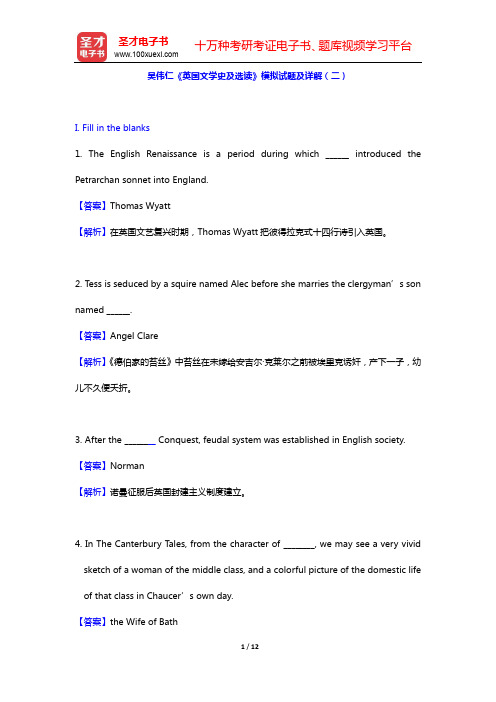thomas hardy the darkling thrush 赏析
HardyandTess托马斯·哈代简介和作品赏析

苔丝被塑造成一个纯洁、善良、坚强的女性形象,她的遭遇反映了当时社会对 女性的压迫和束缚;而亚雷和安吉尔则分别代表了社会中的邪恶势力和虚伪道 德,他们的行为对苔丝的命运产生了深远影响。
艺术特色及文学价值
艺术特色
哈代在小说中运用了现实主义的手法,通过细腻的描写和生动的叙述,展现了19 世纪末英国农村的生活面貌和人们的内心世界。同时,他还巧妙地运用了象征、 隐喻等修辞手法,使作品具有深厚的艺术内涵。
06
托马斯·哈代在文学史上的地位 和影响
对当时社会现象反映和批判
揭示社会不公
哈代的作品中经常描写社会的不 公现象,如贫富差距、阶级矛盾 等,通过人物性格和命运的塑造 ,深刻反映了当时社会的弊端。
批判传统观念
哈代在作品中批判了传统的道德 观念、宗教信仰等,提出了对人 性的新的理解和探索,对当时的
社会思想产生了深远的影响。
社会意义与影响
社会意义
《无名的裘德》通过展现主人公裘德的斗争和失败,揭示了当时英国社会的种种弊端和 不公。小说呼吁人们关注社会底层人民的命运,追求自由、平等和真爱,具有深远的社
会意义。
影响
《无名的裘德》在出版后引起了广泛的关注和讨论,对当时的社会观念产生了深远的影 响。同时,小说中的艺术特色和文学价值也使得它成为后世研究和借鉴的重要对象。
影响
自出版以来,《德伯家的苔丝》一直受到读者的喜爱和推崇,被翻译成多种语言并在世界范围内广为 流传。它对后来的文学创作产生了深远的影响,被誉为英国文学史上的里程碑之作。
04
《无名的裘德》赏析
故事情节与人物形象塑造
要点一
故事情节
《无名的裘德》以英国农村为背景,通过主人公裘德的人 生经历以及他与旧秩序、旧道德的斗争,展现了人性的复 杂性和社会的残酷性。故事情节跌宕起伏,引人入胜。
哈代最有名的诗

哈代最有名的诗
哈代(Thomas Hardy)是英国著名的小说家和诗人,他的作品以其深刻的思想和精湛的文学技巧而闻名于世。
在他的众多诗歌作品中,有一首被誉为他最有名的诗,那就是《被复活的人》(The Re-awakening)。
《被复活的人》讲述了一个人在乡间漫步时,突然发现一个被遗忘的坟墓。
坟墓上的铭文让他产生了对逝去的人的好奇心,他开始想象逝去者的生活和悲伤。
这首诗描绘了人们对生死和逝去的思考,以及对未知事物的好奇心和恐惧。
这首诗以其深刻的主题和优美的语言而广为传颂。
哈代通过这首诗表现了对生命和死亡的思考,以及对逝去者的怀念和敬仰。
他通过这首诗表达了对逝去者的尊重和悼念之情,展现了他对生命和死亡的深刻思考和对人类命运的关怀之情。
《被复活的人》的语言优美,情感细腻,给人以深刻的冲击。
它通过对生命和死亡的思考,引导人们对生命的热爱和对逝去者的怀
念。
这首诗以其独特的艺术魅力和深刻的思想内涵,成为了哈代最有名的诗歌作品之一。
通过《被复活的人》,我们不仅可以感受到哈代对生死的思考和对逝去者的怀念,还能从中领略到他对人类命运的关怀和对人生的深刻思考。
这首诗以其独特的艺术魅力和深刻的思想内涵,成为了哈代最有名的诗歌之一,也为我们留下了一部深刻思考人生和死亡的杰作。
The Love Song of J Alfred Prufrock赏析

Senza tema d’infamia ti rispondo.
我回答你就不必害怕流言。
Let us go then, you and I, 那么我们走吧,你我两个人, When the evening is spread out against the sky 正当朝天空慢慢铺展着黄昏 Like a patient etherized upon a table; 好似病人麻醉在手术桌上; Let us go, through certain half-deserted streets, 我们走吧,穿过一些半清冷的街, The muttering retreats 那儿休憩的场所正人声喋喋; Of restless nights in one-night cheap hotels 有夜夜不宁的下等歇夜旅店 And sawdust restaurants with oyster-shells 和满地蚌壳的铺锯末的饭馆 Streets that follow like a tedious argument 街连着街,好象一场讨厌的争议 Of insidious intent 带着阴险的意图 To lead you to an overwhelming question ...、 要把你引向一个重大的问题…… Oh, do not ask, “What is it?“ 唉,不要问,“那是什么?” Let us go and make our visit. 让我们快点去作客。
In the room the women come and go 在客厅里女士们来回地走, Talking of Michelangelo. 谈着画家米开朗基罗。
The yellow fog that rubs its back upon the window-panes, 黄色的雾在窗玻璃上擦着它的背, The yellow smoke that rubs its muzzle on the windowpanes, 黄色的烟在窗玻璃上擦着它的嘴, Licked its tongue into the corners of the evening, 把它的舌头舐进黄昏的角落, Lingered upon the pools that stand in drains, 徘徊在快要干涸的水坑上; Let fall upon its back the soot that falls from chimneys, 让跌下烟囱的烟灰落上它的背, Slipped by the terrace, made a sudden leap, 它溜下台阶,忽地纵身跳跃, And seeing that it was a soft October night, 看到这是一个温柔的十月的夜, Curled once about the house, and fell asleep. 它溜下台阶,忽地纵身跳跃,于是便在房子附近蜷伏起来安睡。
吴伟仁《英国文学史及选读》模拟试题及详解(二)【圣才出品】

吴伟仁《英国文学史及选读》模拟试题及详解(二)I. Fill in the blanks1. The English Renaissance is a period during which ______ introduced the Petrarchan sonnet into England.【答案】Thomas Wyatt【解析】在英国文艺复兴时期,Thomas Wyatt把彼得拉克式十四行诗引入英国。
2. T ess is seduced by a squire named Alec before she marries the clergyman’s son named ______.【答案】Angel Clare【解析】《德伯家的苔丝》中苔丝在未嫁给安吉尔·克莱尔之前被埃里克诱奸,产下一子,幼儿不久便夭折。
3. After the ________ Conquest, feudal system was established in English society. 【答案】Norman【解析】诺曼征服后英国封建主义制度建立。
4. In The Canterbury T ales, from the character of ________, we may see a very vivid sketch of a woman of the middle class, and a colorful picture of the domestic life of that class in Chaucer’s own day.【答案】the Wife of Bath【解析】《坎特伯雷故事集》中,乔叟通过对来自中产阶级的巴斯夫人的生动细腻的描写,展示了当时中产阶级多彩的生活画卷。
5. “Wherefore, Bees of England, forge/Many a weapon, chain, and scou rge, /That these stingless drones may spoil/The forced produce of your toil?”In the above quotation taken from Shelley’s poem “A Song: Men of England”, what does the word “bees” refer to?A. ruling class in human societyB. the laboring people in EnglandC. English youthD. wives of the workers in England【答案】B【解析】“英格兰的工蜂”指的是广大劳动人民。
thomasHardy解读教学文稿

Failure -----success
Unable to find a public for his poetry and following the advice of novelist George Meredith, Hardy decided to write novels.
His first novel, The Poor Man and the Lady,
His position on the history of English Literature
Thomas Hardy is one of the most important novelists in the Victorian Era and the first important poet in the 20th century. In many respects, Hardy was trapped in the middle ground between the nineteenth and twentieth centuries, between Victorian sensibilities and more modern ones, and between tradition and innovation.
Two novels aroused debate
Tess of the D‘urbervilles (1891), which deals
Thomas and Jemima Hardy
Hardy’s birth place
Hardy’s Cottage
Higher Bockhampton, Dorchester, Dorset
Dorchester, County Town of Dorset
读哈代短篇小说报告

Thomas Hardy (1840-1928), was an English novelist and poet. His father Thomas worked as a stonemason and local builder in the countryside, so he was quite familiar with rural life and focused more on a declining rural society when the Machine Age was coming. He gained fame as the author of novels, including Far from the Madding Crowd (1874), The Mayor of Casterbridge (1886), Tess of the d'Urbervilles (1891) and Jude the Obscure(1895). Hardy believed in the philosophy of pessimism, which could be proved in his short stories, like “The Three Strangers”, “The Marchioness of Stonehenge” and “The Son;s Veto”. Most of his fictional works were set in the semi-fictional region of Wessex. They explored tragic characters struggling against their passions and social circumstances.One of the famous short stories in the Selected Stories of Thomas Hardy is“The Three Strangers”. A large party was holding in a shepherd’s cottage where guests absolutely enjoyed music and mead when three strangers interrupted them one by one. All guests took little notice of the first stranger because of his normal behaviors in appearance. But they found dreadfully that the second stranger was a cruel executioner who came here to chase the escaped prisoner. The third stranger, who was suspected of crime from his panic-stricken behaviors when hearing the song about hanging, was finally proved to be the brother of the prisoner, the first stranger.The ending was quite unexpected. It seemed that the third stranger was undoubtedly the prisoner because Hardy dedicated a significant portion of the story describing how he was chased, which led to a dramatic climax. However, if you read it again carefully, you could find sufficient but veiled evidences to prove that the first stranger was more suspicious. For example, when he came into the house, “his hat hung low over his eyes which moved with a flash round the room”; when someone said what a man is could be told by his hands “his hands instinctively sought the shade”because he lied that he was a wheelwright but actually was a watch-and-clock maker.Moreover, Hardy’s excellent writing skills could also be traced in the comparisons all over the text. Firstly, the agricultural society was being taken place by the industrial society, which was like the rainstorm in the story sweeping the shepherd’s cottage devastatingly. The longly cottage was the epitome of the agricultural society. Unfortunately, people took little attention to the great changes outsides, dipping themselves into music and mead. Comparatively, Hardy showed great devotion to the rural life, he was critical much of the damages on agricultural civilization by industry, which was corresponding to his philosophy of pessimism.Secondly, the contrast between the prisoner and the executioner. I think they represented the poor and the rich respectively. In the story, the prisoner was sentenced to be hanged just because he stole a sheep to prevent his family members from st arving. Only the poor expressed sympathy to him,“the intended punishment was cruelty disproportioned to the transgression”. However, the executioner, the representation of the rich, was indifferent to the poor. He drank as much mead as the shepherd could not bear and regarded them as simple-minded souls. He was totally ignorant of legal knowledge, abusing authority for chasing the so-called prisonerwithout valid evidences.The last but not the least, the ending witnessed some differences between the story and the reality. “The prisoner was never recaptured”, noting that Hardy would always speak up for the poor though in reality, they were in a weak position. At the end, Hardy signed over the passage of time by presenting us the graves of villagers. However, the agricultural civilization would never be declining in Hardy’s heart, like“the story about three strangers at the shepherd’s that night is well known forever in the country about Higher Crowstairs.”The other well-known story is “The Marchioness of Stonehenge”. Caroline, the daughter of an earl, regretted marrying to a poor man. After his death, considering her reputation and honor, she sent her son to a countrywoman Milly, who loved deeply to the poor man. Milly therefore was regarded as a secret wife of the man and the mother of the son. Later Caroline married to a marquis but became a widow soon with no child. She tried to gain the love from her own child but failed.I think there are two plotlines in the story: the destiny of Milly and Caroline. Milly loved the man deeply , but she had no opportunity to be his wife till his death. However, she was satisfied with all these honors and dipped herself into the happiness of being his nominal wife. The happier she was, the more tragic her life seemed to be. Fortunately, Hardy tried to make things better for this kind-hearted woman. She finally gained the true love from her foster son. This was accordance with Hardy’s intension showing great devotion and sympathy to the poor.By contrast, Caroline, a wealthy but selfish and vain woman, served her reputation and honor first. However, initially, she was pure and innocent. She did love the poor man and married to him secretly. But with the coming of the industrial ages, the gap between the poor and the rich was becoming obviously. People was under a frost of class-division and social prejudices, which made her human affection become shamefaced and mean. To some extent, she had no choice but to give way to the whole society.Just like the ending of the story described, “ There was no pathos like the pathos of childhood, when a child found itself in a world where it was not wanted, and could not understand the reason why.”I can’t agree with Hardy more, but what about a child born with too much attention? There is no voice for itself to make decisions on marriage or making friends. It deserves a degree of sympathy, too.。
Hardy_and_Tess托马斯·哈代简介和作品赏析

Hardy's work refimism and sense of tragedy in human life.
The Mayor of Casterbridge
Hardy’s Major works
Poetry: 1898: Hardy published his first book of verse, Wessex Poems 1902: The Dynasts, in dramatic blank verse, was published 1914: A Changed Man and Other Tales was published
Childhood
Hardy was frail as a child, and did not start at the village school until he was 8. One year later he transferred to a new school in the county town of Dorchester. At 16 he was apprenticed to a local architect.
Thomas Hardy
(1840 - 1928)
Contents
1. Hardy’s life 2. 3. 4.
Hardy’s works Features of his novels Tess of the D’urbervilles Discussion of Tess
5.
Part I
Hardy’s life
Hardy’s Cottage
Pictures of Hardy
Marriage
First: in 1874---Emma Gifford , sister-in-law of a vicar , died in 1912
英国作家哈代个人及作品简介 1_Thomas_Hardy__

❖ In a recent biography on Hardy, Claire Tomalin argues that Hardy became a truly great English poet after the death of his first wife, Emma
❖ There he met and fell in love with Emma Gifford.
❖ His break with architecture occurred in the summer of 1872.
❖ He published A Pair of Blue Eyes in the form of 11 monthly installments
❖ born at Higher Bockhampton
a hamlet in the parish of Stinsford to the east of Dorchester in Dorset, England.
❖ His father (Thomas) worked as a stonemason and local builder.
William Boldwood, the deeply obsessive farmer.
❖ Wessex Tales (《威塞克斯故事 集》,1888) was the first collection of the short stories that Hardy had long been publishing in magazines.
- 1、下载文档前请自行甄别文档内容的完整性,平台不提供额外的编辑、内容补充、找答案等附加服务。
- 2、"仅部分预览"的文档,不可在线预览部分如存在完整性等问题,可反馈申请退款(可完整预览的文档不适用该条件!)。
- 3、如文档侵犯您的权益,请联系客服反馈,我们会尽快为您处理(人工客服工作时间:9:00-18:30)。
thomas hardy the darkling thrush 赏析
托马斯·哈代(Thomas Hardy)是19世纪末至20世纪初英国最杰出的文学家之一,他的作品主题深邃,笔触细腻,深受读者喜爱。
其中,《The Darkling Thrush》是他众多诗歌中的一首,通过对一只在冬日暮色中鸣叫的暗淡的知更鸟的描绘,传达了深沉而独特的情感。
《The Darkling Thrush》这首诗的情感基调是哀伤与希望并存。
在寒冷的冬日,知更鸟在暮色中唱出凄凉的歌声,象征着生命的脆弱和世界的冷酷。
然而,这只鸟儿“不顾九月的苍穹已不再看顾它的歌”,坚持歌唱,仿佛在冷酷的世界中找寻着希望。
哈代的诗歌常常通过自然和人类的困境来映射社会的冷漠和人生的苦难。
在这首诗中,他运用象征手法,将知更鸟的歌唱与人类的困境和挣扎紧密相连。
知更鸟的歌声不仅仅是自然的声响,更是对生活的热爱、对未来的渴望和对苦难的抗争。
此外,哈代的诗歌语言优美、节奏感强,通过细致入微的观察和描绘,将读者带入一个既真实又充满诗意的世界。
他的诗歌往往富有哲理,引人深思。
《The Darkling Thrush》这首诗以其独特的情感和哲理,让读者在欣赏其美的同时,思考人生的意义和价值。
哈代的诗歌不仅表达了他对人生的独特见解,也展现了他作为一位伟大文学家的艺术才华。
这首诗以其深刻的主题和独特的艺术手法,成为了英国文学中的经典之作。
